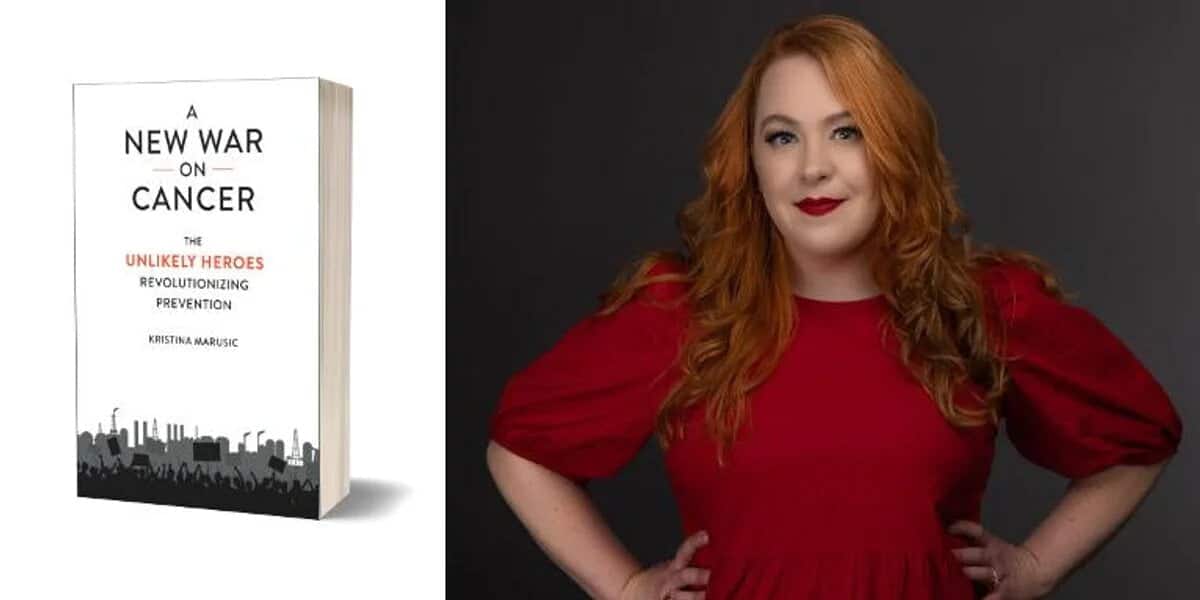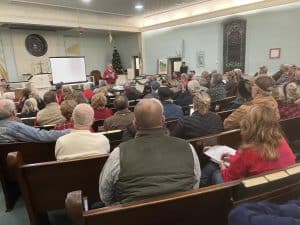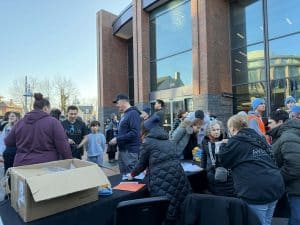While advancements in cancer research and treatment within the past 50 years have saved countless lives, there remains a pressing issue that mainstream media overlooks: prevention. When her sister was diagnosed with thyroid cancer in 2011, investigative journalist Kristina Marusic decided to research what could have caused the disease, since thyroid cancer did not run in her family. What she discovered led to her newly published book, A New War on Cancer: The Unlikely Heroes Revolutionizing Prevention. In the book, Marusic reveals the environmental factors that contribute to cancer cases in the United States, from air pollution to chemicals in commercial products, and tells the stories of the patients, advocates, and oncologists who are working on preventing the environmental and social factors that cause the disease.
Marusic is an award-winning journalist for Environmental Health News whose work has been published to outlets including CNN, Vice, the Washington Post, and The Advocate. Her writing covers topics ranging from the environment to LGBTQ+ rights to feminism.
In an interview on Raging Chicken’s Out d’Coup podcast in May, Marusic explained the importance of prevention efforts. “Any cancer survivor will tell you that they would have rather had prevention than a cure,” she said. “We don’t have to wait until we have all of the answers before we can take action and start protecting people…Certainly, we should keep trying to figure out why, but we can protect people in the meantime.”
A New War on Cancer highlights how cancer patients tend to blame themselves for their diagnosis because most mainstream discussions about prevention focus primarily on an individual’s responsibility to look after their health by eating the right foods, getting enough exercise, and avoiding alcohol or cigarettes. While these practices are valuable, systemic issues like corporations’ disregard for anti-pollution regulations and inadequate testing for chemicals in products play a steadily increasing role in U.S. cancer cases. A 2010 study by the U.S. President’s Cancer Panel found that two-thirds of cases were linked to environmental exposure. In her research for the book, Marusic found that the percentage has increased dramatically since then. “The National Institutes of Health put that number even higher,” she said. “They say that 90-95% of cancer cases are caused by preventable factors, which is shockingly high.”
The rapid increase in cancer cases linked to industrial, chemical contaminants is not experienced equally by all parts of American society, however. Marusic found that people of color are significantly more likely to be affected by environmental factors regardless of where they live due to the lingering effects of redlining and white supremacy. Black women in particular are especially at risk due to the amount of products that encourage them to straighten their hair. “One of the reasons that use of those products in those communities, particularly among Black women in the United States, is more prevalent than it is among white women is that, historically, white colonizers and enslavers used differences in skin color and hair texture as justifications for treating Black women as less than human,” she said. “So erasing those features or striving to have straight hair, to look more like a white woman, became a survival adaptation.”
While the increase in environmentally linked cancer cases is alarming, Marusic’s book highlights the incredible work being done by doctors, researchers, community members, and activists to change the paradigm for combating cancer systemically. For example, Melanie Meade is a clean air activist from Clairton, Pennsylvania, an area filled with air pollution from years of coke battery production. Meade lost her parents and siblings to cancer, respiratory disease, and heart disease caused by the polluted air, and became an advocate for clean air.
“I think her story is moving to me because of her resilience, because she’s gone through such personal trauma related to this issue, and it’s incredible to me that she stays and keeps fighting,” Marusic said. “But also because there are Melanie Meades all across the country and all across the world who are up against really impossible odds and continue to fight for the health of their communities.”
Marusic told readers and listeners how they could get involved in the prevention movement. Her book’s appendix contains a list of people and organizations focusing on cancer prevention in the United States.
“There are already people who are doing incredible work to try and advance change that will protect all of us and lead to less cancer in our communities, and we can support them in that work,” she said. “Another way we can do that is by following these organizations on social media and signing up for their newsletters…you can help amplify calls to action like signing petitions, reaching out to key lawmakers, or going to vote.”
She encouraged those who are interested to buy the book and share it with friends. “None of us have to start from scratch on this issue,” she said. “What a relief, right?”
The interview can be found here, and her book can be purchased on the Island Press website, Amazon, and Bookshop. Marusic’s website includes links to her essays, places to purchase her book, and further information about her life and background.







